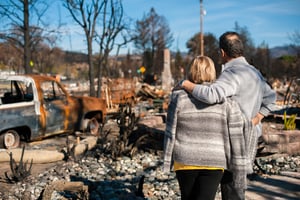 Recent disasters both near, like the flooding in Berks County, and far, like the destructive fire at the Notre Dame Cathedral, has many homeowners wondering whether they have enough Homeowners’ Insurance to protect their assets.
Recent disasters both near, like the flooding in Berks County, and far, like the destructive fire at the Notre Dame Cathedral, has many homeowners wondering whether they have enough Homeowners’ Insurance to protect their assets.
The time to answer that question is now, not after a disaster when it’s too late.
Here are Three Questions Every Homeowner Should Ask:
How Will I Replace My Home if it is Completely Destroyed?
Homeowners insurance is meant to protect your personal property (furniture, electronics, clothing, etc.) and your home. You must make sure you have enough coverage to rebuild your life if everything is destroyed.
When determining the amount of coverage needed, some homeowners purchase the minimum amount of insurance required by their lenders. This is rarely (if ever) enough to rebuild your home if it is destroyed, let alone replace everything inside it.
Some homeowners base their coverage on the real estate value of their home rather than what it would cost to rebuild. Again, this amount of coverage is rarely if ever enough to rebuild your home and replace the contents within.
These misconceptions and mistakes in property descriptions along with rising construction costs and home improvements after the purchase of policies have resulted in about 60% of all U.S. homes being underinsured by an average of 20 %, according to Consumer Reports.
It’s essential that you talk to an experienced insurance agent to help you determine the amount of coverage that is right for you.
Here are three additional coverages you may want to consider for your home:
An Extended Replacement Cost policy provides additional insurance coverage of 20% or more over the limits of your policy, which can be crucial if there is a widespread disaster in your area and the cost of construction increases.
Ordinance or Law Coverage – If you need to rebuild your home, you may be subject to new and sometimes stricter building codes, which could increase the cost to rebuild.
Flood Insurance – Flood damage is usually not covered under a standard homeowner’s policy, and there was a time when only people living in high-risk flood zones purchased additional coverage for flooding. In recent years, people who never experienced flooding in their homes before are experiencing it now, and they have little or no insurance coverage to help with the cleanup and repairs.
How Will I Replace My Possessions if They are Destroyed?
Most homeowners’ insurance policies cover your home’s contents, but it’s essential to understand the difference between replacement cost and actual cash value. Replacement cost policies pay what you need to replace a damaged or destroyed item; whereas actual cash value pays what the item is worth at the time it is damaged or destroyed.
For example, if there’s a fire in your home and your 10-year-old kitchen appliances are destroyed and need to be replaced, an actual cash value policy will pay you what those 10-year-old appliances were worth when they were damaged, which is probably not enough to go out and buy new appliances to replace the damaged appliances.
How Will I Pay for Living Expenses If I Can’t Live in My Home?
Where will you live if your home is temporarily inaccessible or needs to be completely rebuilt? You might have a friend or relative who would take you in for a little while, but for many families, that is not a viable option.
Coverage for additional living expenses will cover part or all of the cost of hotels, meals, and other living expenses you would incur if you were displaced due to an insured disaster. It would not cover regular expenses like your mortgage or groceries.
Taking the time to answer these three questions now will help ensure that should a disaster strike, you will be financially prepared.
How Can You Protect Your Home and Family From Disaster?
The experienced agents at American Insuring Group can provide a free insurance review to discuss your potential risks and how to protect you from those risks. Plus, as independent agents, we will check with lots of insurance companies to make sure you get the best price on that coverage. Give us a call at (800) 947-1270 or (610) 775-3848 or connect with us online.







